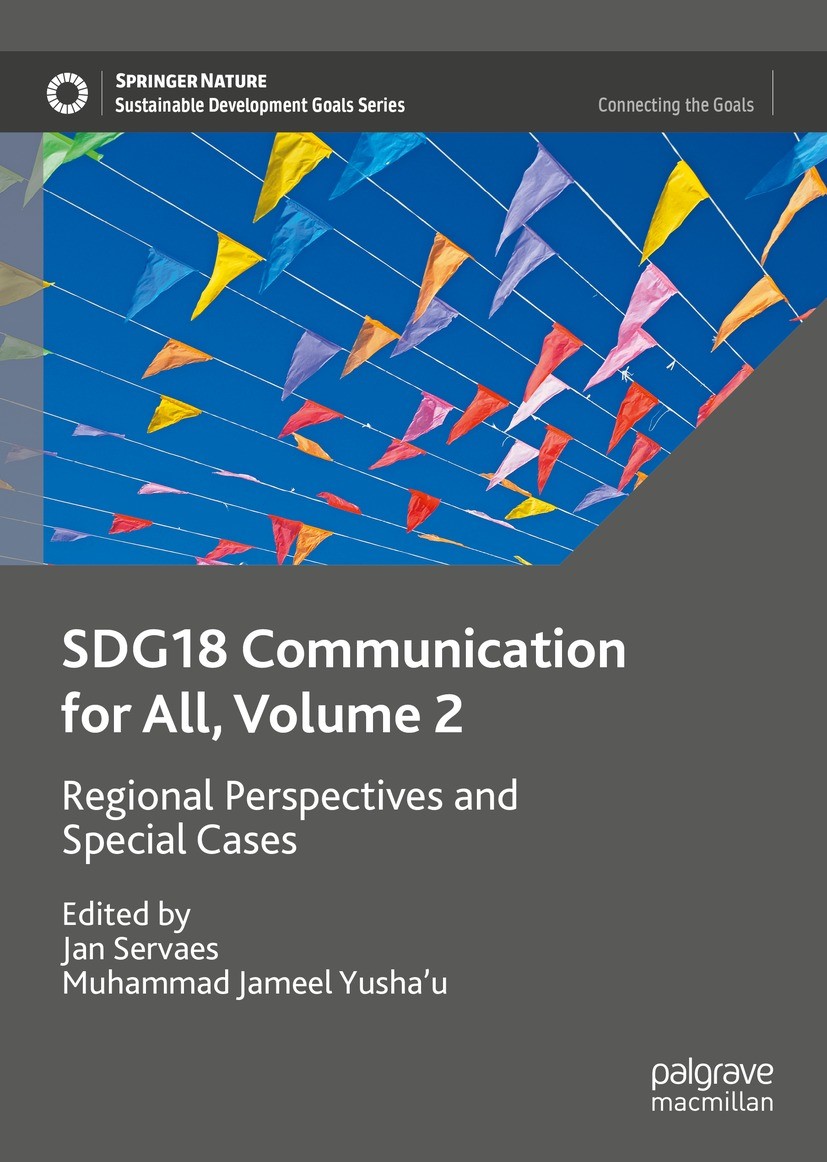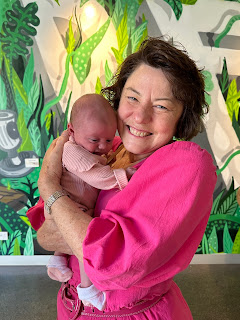The special issue of International Journal of Speech-Language Pathology has just been published
Title: Communication, Swallowing and the Sustainable Development Goals
Guest Editors: Sharynne McLeod and Julie Marshall
Each article is free to access (for 1 year).
Armstrong, E., McAllister, M., Coffin, J., Robinson, M., Thompson, S., Katzenellenbogen, J., Colegate, K., Papertalk, L., Hersh, D., Ciccone, N., & White, J. (2023). Communication services for First Nations peoples after stroke and traumatic brain injury: Alignment of Sustainable Development Goals 3, 16 and 17. International Journal of Speech-Language Pathology, 25(1), 147-151.
https://doi.org/10.1080/17549507.2022.2145356
Atherton, M., McAllister, L., Luong Thi Cam, V., & Hoang Thi Huyen, T. (2023). Community-based rehabilitation workers in Vietnam need assistance to support communication and swallowing: Sustainable Development Goals 3, 4, 8, 10, 17. International Journal of Speech-Language Pathology, 25(1), 107-111. https://doi.org/10.1080/17549507.2022.2132292
Baker, E., Li, W., Hodges, R., Masso, S., Jones, C., Guo, Y., Alt, M., Antoniou, M., Afshar, S., Tosi, K., & Munro, N. (2023). Harnessing automatic speech recognition to realise Sustainable Development Goals 3, 9, and 17 through interdisciplinary partnerships for children with communication disability. International Journal of Speech-Language Pathology, 25(1), 125-129. https://doi.org/10.1080/17549507.2022.2146194
Barrett, H., & Marshall, J. (2023). Participation, equality, and justice in Rwanda for people who experience communication disability: Achieving Sustainable Development Goal 16. International Journal of Speech-Language Pathology, 25(1), 136-140. https://doi.org/10.1080/17549507.2022.2140828
Bryce, R., Easton, C., Bong, D., Net, C., Chan, S., & Knight, J. (2023). Building the speech-language pathology workforce in Cambodia through the lens of the Sustainable Development Goals. International Journal of Speech-Language Pathology, 25(1), 112-118. https://doi.org/10.1080/17549507.2022.2146192
Camarata, S., Liu, X. L., Lee, W., Li, T., Jiang, F., & Simms, M. (2023). Adapting the UNICEF/WHO Nurturing Care Framework for speech-language pathologists to support Sustainable Development Goal 4. International Journal of Speech-Language Pathology, 25(1), 82-86. https://doi.org/10.1080/17549507.2022.2141327
Carroll, C., Fitzgibbon, I., & Caulfield, M. (2023). Community and university partnerships: Integrating Sustainable Development Goals 3, 4, 10, 11, and 17. International Journal of Speech-Language Pathology, 25(1), 102-106. https://doi.org/10.1080/17549507.2022.2154081
Chen, L., Debono, D., & Hemsley, B. (2023). A bite closer: Using 3D food printing to achieve Sustainable Development Goals 2, 3, 9 and 17. International Journal of Speech-Language Pathology, 25(1), 58-61. https://doi.org/10.1080/17549507.2022.2132290
Crowe, K., Másdóttir, T., & Volhardt, M. D. S. (2023). Maximise your impact: Sustainable Development Goals-Focussed content in communication intervention and teaching. International Journal of Speech-Language Pathology, 25(1), 188-192. https://doi.org/10.1080/17549507.2022.2153165
Dada, S., Tönsing, K., Bornman, J., Samuels, A., Johnson, E., & Morwane, R. (2023). The Sustainable Development Goals: A framework for addressing participation of persons with complex communication needs in South Africa. International Journal of Speech-Language Pathology, 25(1), 47-51. https://doi.org/10.1080/17549507.2022.2143566
Dada, S., Wylie, K., Marshall, J., Rochus, D., & Bampoe, J. O. (2023). The importance of SDG 17 and equitable partnerships in maximising participation of persons with communication disabilities and their families. International Journal of Speech-Language Pathology, 25(1), 183-187. https://doi.org/10.1080/17549507.2022.2150310
Freeman, L., Staley, B., & Wigglesworth, G. (2023). Assessment equity for remote multilingual Australian Aboriginal students through the lens of Sustainable Development Goals. International Journal of Speech-Language Pathology, 25(1), 157-161. https://doi.org/10.1080/17549507.2022.2129788
Freeman-Sanderson, A., Hammond, N. E., Brodsky, M. B., Thompson, K., & Hemsley, B. (2023). Sepsis, critical illness, communication, swallowing and Sustainable Development Goals 3, 4, 10. International Journal of Speech-Language Pathology, 25(1), 68-71. https://doi.org/10.1080/17549507.2022.2132291
Gillett-Swan, J. K., & Burton, L. O. (2023). Amplifying children’s voices: Sustainable Development Goals and inclusive design for education and health architecture. International Journal of Speech-Language Pathology, 25(1), 87-91. https://doi.org/10.1080/17549507.2022.2148742
Given, F., Allan, M., McCarthy, S., & Hemsley, B. (2023). Digital health autonomy for people with communication or swallowing disability and the Sustainable Development Goal 10 of reducing inequalities and Goal 3 of good health and well-being. International Journal of Speech-Language Pathology, 25(1), 72-76. https://doi.org/10.1080/17549507.2022.2092212
Hamill, L., Kearns, A., Doig, L., Hesse, M., Frederick, D., Purcell, A., & Woolfenden, S. (2023). Screening for unmet social needs in paediatric speech-language pathology to achieve the Sustainable Development Goals. International Journal of Speech-Language Pathology, 25(1), 77-81. https://doi.org/10.1080/17549507.2022.2134456
Hemsley, B., Darcy, S., Given, F., Murray, B. R., & Balandin, S. (2023). Going thirsty for the turtles: Plastic straw bans, people with swallowing disability, and Sustainable Development Goal 14, Life Below Water. International Journal of Speech-Language Pathology, 25(1), 15-19. https://doi.org/10.1080/17549507.2022.2127900
Isaksen, J., Beeke, S., Pais, A., Efstratiadou, E.-A., Pauranik, A., Revkin, S. K., Vandana, V. P., Valencia, F., Vuksanović, J., & Jagoe, C. (2023). Communication partner training for healthcare workers engaging with people with aphasia: Enacting Sustainable Development Goal 17 in Austria, Egypt, Greece, India and Serbia. International Journal of Speech-Language Pathology, 25(1), 172-177. https://doi.org/10.1080/17549507.2022.2145355
Jagoe, C., O’Reilly, C. F., Gunnell, H., Tirzi, K., Lancaster, C., & Brahmbhatt, K. (2023). Communicating accessible messages for food insecure communities in Northern Mozambique: Supporting Sustainable Development Goal 2. International Journal of Speech-Language Pathology, 25(1), 62-67. https://doi.org/10.1080/17549507.2022.2140829
Jagoe, C., O’Reilly, C. F., James, L. E., Khaled, E., Alazzawi, H., & Enright, T. (2023). Interpersonal violence experienced by people with communication disabilities in Iraq: Sustainable Development Goals 16 and 5. International Journal of Speech-Language Pathology, 25(1), 130-135. https://doi.org/10.1080/17549507.2022.2146193
Kearns, Á., Clarke, D., Cusack, A., Gallagher, A., Humphreys, J., Kedge, S., & McKee, A. (2023). Intermediaries in the justice system for people with communication disability: Enacting Sustainable Development Goal 16 in Ireland, Northern Ireland, and New Zealand. International Journal of Speech-Language Pathology, 25(1), 141-146. https://doi.org/10.1080/17549507.2022.2134457
Khattab, G., Abdelwahab, A. G. S., Al-Shdifat, K., Alsiddiqi, Z., Floccia, C., Kouba Hreich, E., McKean, C., Messarra, C. M., Odeh, T., & Trebacz, A. (2023). Promoting early language development in the Arab world and Sustainable Development Goals 3, 4, 10 and 17. International Journal of Speech-Language Pathology, 25(1), 96-101. https://doi.org/10.1080/17549507.2022.2134459
McGill, N., Verdon, S., Curtin, M., Crockett, J., Parnell, T., & Hodgins, G. (2023). The impact of climate-related disasters on children’s communication and wellbeing: Addressing Sustainable Development Goals. International Journal of Speech-Language Pathology, 25(1), 20-26. https://doi.org/10.1080/17549507.2022.2156613
McLeod, S., & Marshall, J. (2023). Communication for all and the Sustainable Development Goals. International Journal of Speech-Language Pathology, 25(1), 1-8. https://doi.org/10.1080/17549507.2022.2160494
Nancarrow, S., McGill, N., Baldac, S., Lewis, T., Moran, A., Harris, N., Johnson, T., & Mulcair, G. (2023). Diversity in the Australian speech-language pathology workforce: Addressing Sustainable Development Goals 3, 4, 8, and 10. International Journal of Speech-Language Pathology, 25(1), 119-124. https://doi.org/10.1080/17549507.2023.2165149
Pillay, M., Quigan, E., & Kathard, H. (2023). Questions of suitability: The Sustainable Development Goals. International Journal of Speech-Language Pathology, 25(1), 162-166. https://doi.org/10.1080/17549507.2022.2160013
Salins, A., Nash, K., Macniven, R., Halvorsen, L., Lumby, N., & McMahon, C. (2023). Culturally safe speech-language supports for First Nations children: Achieving Sustainable Development Goals 3, 4, 8 and 10. International Journal of Speech-Language Pathology, 25(1), 152-156. https://doi.org/10.1080/17549507.2022.2143565
Sherratt, S. (2023). Ameliorating poverty-related communication and swallowing disabilities: Sustainable Development Goal 1. International Journal of Speech-Language Pathology, 25(1), 32-36. https://doi.org/10.1080/17549507.2022.2134458
Snoddon, K., & Murray, J. J. (2023). Supporting deaf learners in Nepal via Sustainable Development Goal 4: Inclusive and equitable quality education in sign languages. International Journal of Speech-Language Pathology, 25(1), 92-95. https://doi.org/10.1080/17549507.2022.2141325
Sommer, C. L., Crowley, C. J., Moya-Galé, G., Adjassin, E., Caceres, E., Yu, V., Coseteng-Flaviano, K., Obi, N., Sheeran, P., Bukari, B., Musasizi, D., & Baigorri, M. (2023). Global partnerships to create communication resources addressing Sustainable Development Goals 3, 4, 8, 10, and 17. International Journal of Speech-Language Pathology, 25(1), 167-171. https://doi.org/10.1080/17549507.2022.2130430
Sowden, R., Wekhoola, A., & Musasizi, D. (2023). Partnerships between Uganda, Kenya, and Rwanda and the United Kingdom to address Sustainable Development Goal 17 for people with communication disability. International Journal of Speech-Language Pathology, 25(1), 178-182. https://doi.org/10.1080/17549507.2022.2143564
Wailes, E., & Mackenzie, F. (2023). Protecting people with communication disability from modern slavery: Supporting Sustainable Development Goals 8 and 16. International Journal of Speech-Language Pathology, 25(1), 42-46. https://doi.org/10.1080/17549507.2022.2150309
Wallis, A. K., Westerveld, M. F., & Burton, P. (2023). Ensuring communication-friendly green and public spaces for sustainable cities: Sustainable Development Goal 11. International Journal of Speech-Language Pathology, 25(1), 27-31. https://doi.org/10.1080/17549507.2022.2138544
Weir, S., Arstein-Kerslake, A., Eadie, T., & McVilly, K. (2023). Realising economic and social rights for children with communication and swallowing disability: Sustainable Development Goals 1, 8 and 10. International Journal of Speech-Language Pathology, 25(1), 37-41. https://doi.org/10.1080/17549507.2022.2153166
Zahir, M. Z., Miles, A., Hand, L., & Ward, E. C. (2023). Designing equitable speech-language pathology services in the Maldives to achieve Sustainable Development Goals 10 and 4. International Journal of Speech-Language Pathology, 25(1), 52-57. https://doi.org/10.1080/17549507.2022.2150308
Zoneff, E. R., Gao, D. X., Nisbet, D. R., Grayden, D. B., & Clark, G. M. (2023). Restoration of the senses and human communication: Sustainable Development Goals 3 and 9. International Journal of Speech-Language Pathology, 25(1), 9-14. https://doi.org/10.1080/17549507.2022.2142290






































